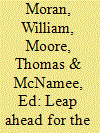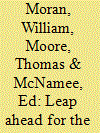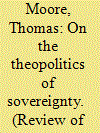| Srl | Item |
| 1 |
ID:
110770


|
|
|
|
|
| Publication |
2011.
|
| Summary/Abstract |
This article assesses the extent to which security regimes are the products of authorization in the thought of Thomas Hobbes and Carl Schmitt. The Hobbesian security regime offers a contingent construction of security in terms of processes of authorization and brings into view questions about the epistemic construction of security within security discourse today. The Schmittian concept of security involves the naturalization of security through the state, meaning that security is understood as condition rather than regime. Rather than look to Carl Schmitt's concept of security as the paradigm of international security today, there are clear benefits in returning to the contractual account of security evident in the Hobbesian emphasis on authorization. Security is not the primary value of political community, but the means by which political communities realize their internal goods. Schmitt's security regime is fictive, driven by colourful metaphor and political theology. By returning to classic questions of authorization-how a security regime authorizes itself-International Relations theory can examine the legitimation of security beyond an exclusively state-centric model.
|
|
|
|
|
|
|
|
|
|
|
|
|
|
|
|
| 2 |
ID:
124044


|
|
|
|
|
| Publication |
2012.
|
| Summary/Abstract |
The article discusses the efficiency of the new Gerald R. Ford-class aircraft carriers of the U.S. Navy. The Ford class represents a ship that is expected to be the centerpiece of U.S. naval power for the rest of the 21st century. The ship will be launched in 2013 before moving her to a pier where construction and outfitting will continue. The current cost of the ship is estimated to be about $12.9 billion.
|
|
|
|
|
|
|
|
|
|
|
|
|
|
|
|
| 3 |
ID:
130346


|
|
|
| 4 |
ID:
176499


|
|
|
|
|
| Summary/Abstract |
This article considers how we can develop a reflexive reading of the theological contours of global politics through Carl Schmitt's account of sovereignty. In doing this it seeks to generate a critical architecture to understand the pluralistic registers of sovereignty within world politics. This article examines the theological dimensions of sovereignty, calling for a closer reading of the theopolitical discourses of legality and legitimacy at work within the largely secular discipline of International Relations. Tracing the pluralistic dimensions of sovereignty – juristic, popular, and theopolitical – allows us to see how sovereignty is operationalised through a range of distinct political registers. When the study of sovereignty is confused with questions of preference for modes of governing (whether secular, religious, democratic, and/or juristic) the complex historical sociology of sovereignty is overlooked. Contemporary scholarship in International Relations can benefit from closer engagement with the multiple, overlapping registers of sovereignty in global politics. We may disagree with Schmitt's reading of sovereignty as ‘theopolitics’ but there is real methodological value in engaging secular scholarship in thinking about religion as a constitutive domain for global order – alongside a rich range of critical approaches.
|
|
|
|
|
|
|
|
|
|
|
|
|
|
|
|
| 5 |
ID:
123390


|
|
|
|
|
| Publication |
2013.
|
| Summary/Abstract |
What can critical geopolitics contribute to an understanding of the political dynamics of humanitarianism within International Relations? This article demands a reconsideration of the concept of humanitarianism by examining the spatial ordering of international society and the geopolitics of international law that condition our understanding of humanitarian agency and conduct within IR. The focus on critical geopolitics seeks to identify the normative structure of humanitarianism and how humanitarian claims - which are seemingly universal - are constituted through specific geopolitical discourses that structure agency and conduct within international life. Considering how humanitarianism is discursively structured as a geopolitical concept involves taking humanitarianism beyond its methodological privileging of impartiality, neutrality, and universality in making sense of humanitarianism. Critical humanitarianism does not accept the grounding of humanitarianism within an intuitive moral framework but instead locates humanitarian agency and conduct within a spatialised understanding of the international system. Such a spatialised ordering of humanitarianism takes the analytical focus away from 'saving strangers' (Wheeler) and 'global conscience' (Linklater) towards a consideration of the ways in which international law is the product of historical particulars that reflect a complex political sociology of the state (Schmitt).
|
|
|
|
|
|
|
|
|
|
|
|
|
|
|
|